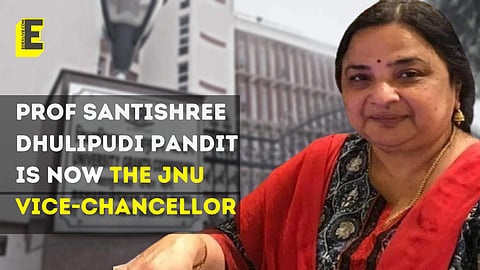

Professor Santishree Dhulipudi Pandit has been appointed as the Vice-Chancellor of Jawaharlal Nehru University (JNU), today, February 7. This holds great significance because Pandit is the first female to be heading the premier institute in Delhi — up until now, she was a professor in the Department of Politics and Public Administration under Pune's Savitribai Phule Pune University.
The move comes days after the Acting JNU VC, M Jagdeesh Kumar, was appointed as the Chairman of the University Grants Commission (UGC). In a press statement, Kumar wrote, "It gives me pleasure to inform you that Prof Santishree Dhulipudi Pandit, Department of Politics and Public Administration, Savitribai Phule Pune University has been appointed as the next Vice-Chancellor of JNU. She is the first female Vice-Chancellor of JNU."
Kumar added, "My hearty congratulations to Prof Santishree Dhulipudi Pandit. I am handing over the charge to her today and wish her success in her new role."
Who is Pandit?
Born in the Soviet Union in 1962, Pandit comes from a long lineage of academicians. Her mother was Mulamoodi Adilakshmi, Professor of Tamil and Telugu at the Leningrad Oriental Faculty Department (USSR) and her father, Dr Dhulipudi Anjaneyulu, was a journalist, an author and a retired civil servant.
She can speak six languages and can understand Kannada, Malayalam and Konkani. Pandit completed her schooling at Madras Higher Secondary and went on to pursue a MA in Political Science degree from the Presidency College, Madras.
In some way, Pandit is back in her alma mater as she did her PhD in International Relations from JNU in 1990. She also got her Post-Doctoral Diploma in Peace and Conflict Studies from Uppsala University in Sweden in 1996.
However, only time will tell if the 'Pandit years' at JNU will see the same fate as that of Kumar, whose term was marred by controversies and criticism. Or, if it will bring forth progressive ideas and changes to India's top and most politically-charged campus.
